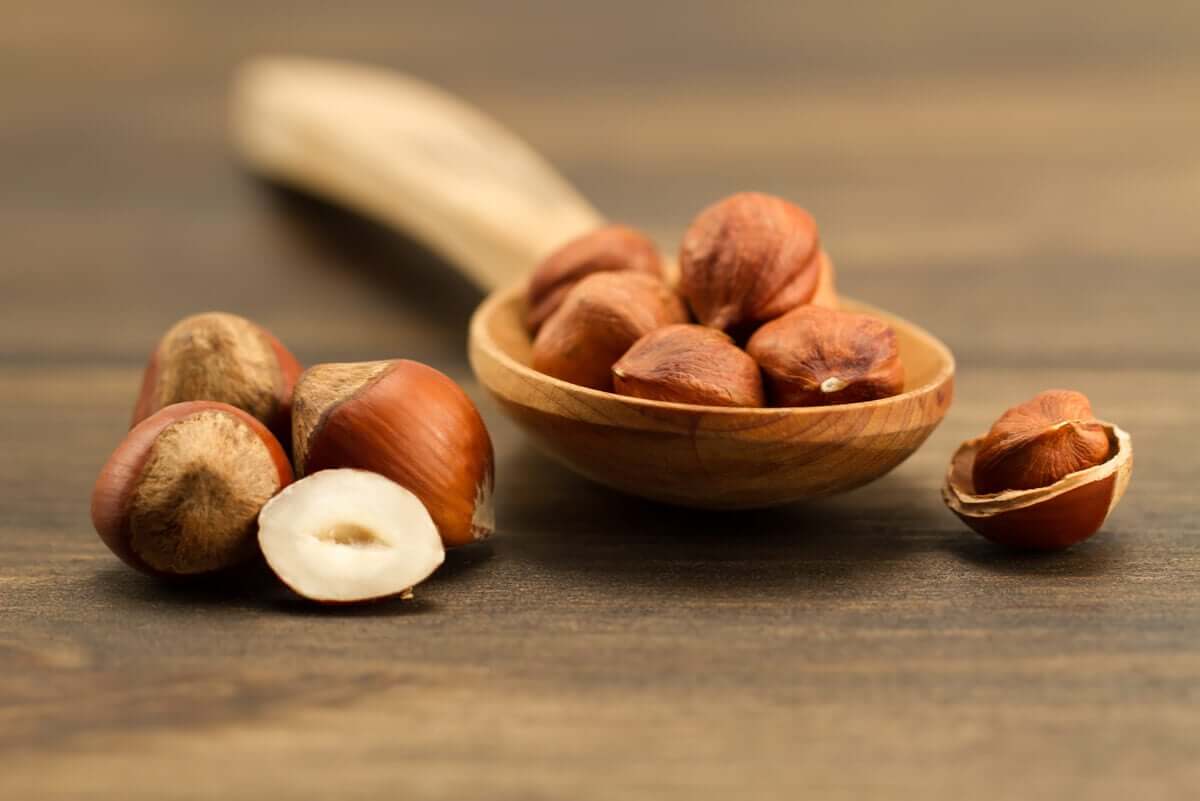Almonds, Walnuts, or Hazelnuts: Which Are Healthier?


Written and verified by the nutritionist Anna Vilarrasa
When it comes to choosing nuts, many people wonder which are the healthiest. Is it almonds, walnuts, or hazelnuts? Do they have significant nutritional differences? Which are the best?
In general, we can say that they have a similar composition and properties. However, each one stands out for a specific component or activity. In fact, on some occasions, it may be best to choose one over the other.
In this article, we’ll explain the benefits of almonds, walnuts, and hazelnuts.
Almonds, walnuts, hazelnuts: The properties of nuts
There’s growing interest in the effect nuts have on people’s health and their ability to prevent some chronic diseases. Also, increasingly more experts are advising people to consume them daily. For this reason, they’ve been included in the dietary recommendations of some countries.
Nuts contain minerals, fiber, healthy fats, protein, and other phytonutrients. Thanks to this, experts have studied their benefits for cardiovascular health, in the prevention of chronic diseases, and even in the reduction of overall mortality.
Also, we can say that the advantages of introducing them into the diet outweigh the possible risks. As a general rule, it seems that people who eat nuts every day have healthier lifestyles.

Read on: The Amazing Benefits of Eating Nuts
The positive effects of almonds
This nut has a proven favorable health impact, whether it’s consumed in small quantities or larger portions. Although it has a significant caloric density, no studies show that bigger servings cause weight gain.
One of the benefits of consuming almonds is for people who suffer from type 2 diabetes or are at risk of developing it. This is because almonds reduce glucose absorption after eating and have a filling effect.
In this case, the action of almonds is stronger if you eat them as a mid-morning snack or during the afternoon. Also, other studies have shown that eating them as a snack reduces hunger and the desire to eat. In fact, doing so doesn’t lead to greater total caloric intake.
On the other hand, it’s advisable for people to introduce them into their diet during growth phases, during menopause, or if they suffer from bone development problems. For example, this includes people who are at risk of osteoporosis.
Although experts don’t fully understand the mechanisms, they’ve observed that the consumption of this nut increases bone mineral density. In fact, almonds contain many of the necessary nutrients to build and maintain healthy bones, including calcium, magnesium, zinc, copper, and manganese.
The peculiarities of walnuts
This nut, whose shape reminds us of the brain, is perhaps one of the most consumed and known in the world. This is partly due to its balanced supply of omega-3 and omega-6 fatty acids and the fact that it’s one of the plant sources of alpha-linolenic acid in vegan diets.
One of the effects that most stands out is its heart health protective effects. According to the results of a scientific article published in The Journal of Nutrition, walnuts lower blood cholesterol, and blood pressure. These are two of the risk factors for heart disease.
However, the benefits of walnuts in protecting this organ don’t end here. In fact, they also have antioxidant and anti-inflammatory effects that improve the condition of the artery walls. This function also benefits the brain and cognitive development.
Studies suggest that including walnuts in your diet can improve cognition and prevent or slow the progression of some degenerative diseases. This includes mild cognitive impairment or Alzheimer’s disease, among others.
Keep reading: Nuts: a Healthy Addition to Your Diet
The properties of hazelnuts

To conclude our analysis of almonds, walnuts, or hazelnuts and which are healthier, it’s time to talk about hazelnuts. Countries of the Mediterranean Basin highly appreciate and consume these little nuts.
One of the main properties of hazelnuts is that they contain antioxidants. This is one of the first properties we can highlight. These compounds protect cells from oxidative damage which, in the long term, can be the cause of problems such as premature aging, cancer, or cardiovascular damage.
Experts also value their anti-inflammatory capacity, which they verified with clinical trials that, also, certified that they don’t make people gain weight. This is a point in favor of hazelnuts and all nuts in general. Contrary to what many people believe and, despite their calories and fat content, they don’t have an impact on excess weight.
Almonds, walnuts, or hazelnuts: Which are healthier?
Now that you’ve seen the properties of these three types of nuts, we can say that none are better or worse than the others. As we mentioned above, including nuts in your diet is generally a beneficial and healthy dietary practice.
Whether it be almonds, walnuts, hazelnuts, or even peanuts, pistachios, Brazil nuts, or pine nuts, it’s a great addition to your diet. Although each one stands out due to a specific characteristic, they all contribute to improving and preventing health problems such as obesity, hypertension, diabetes, and cardiovascular diseases.
All cited sources were thoroughly reviewed by our team to ensure their quality, reliability, currency, and validity. The bibliography of this article was considered reliable and of academic or scientific accuracy.
- Chauhan A, Chauhan V. Beneficial Effects of Walnuts on Cognition and Brain Health. Nutrients. Febrero 2020.12(2):550.
- Craig W.J, et al. Position of the American Dietetic Association: vegetarian diets. Journal of the American Dietetic Associaciation. Julio 2009. 109(7):1266-82.
- De Souza RGM, et al. Nuts and Human Health Outcomes: A Systematic Review. Nutrients. Diciembre 2017.9(12):1311.
- Di Renzo L, et al. A Hazelnut-Enriched Diet Modulates Oxidative Stress and Inflammation Gene Expression without Weight Gain. Oxidative Medicine and Cellular Longevity. Julio 2019.2019:4683723.
- Guasch-Ferré M, et al. Nut Consumption and Risk of Cardiovascular Disease. Journal of Amercian College of Cardiology. Noviembre 2017.70(20):2519-2532.
- Eneroth H, et al. Risks and Benefits of Increased Nut Consumption: Cardiovascular Health Benefits Outweigh the Burden of Carcinogenic Effects Attributed to Aflatoxin B₁ Exposure. Nutrients. Diciembre 2017.9(12):1355.
- Hollis J, Mattes R. Effect of chronic consumption of almonds on body weight in healthy humans. The British Journal of Nutrition. Setiembre 2007. 98(3):651-6.
- Hull S, et al. A mid-morning snack of almonds generates satiety and appropriate adjustment of subsequent food intake in healthy women. European Journal of Nutrition. Agosto 2015. 54(5):803-10.
- Penny M. Kris-Etherton. Walnuts Decrease Risk of Cardiovascular Disease: A Summary of Efficacy and Biologic Mechanisms, The Journal of Nutrition. Abril 2014. 144(4): 547S–554S.
- Pepa GD, Brandi ML. Microelements for bone boost: the last but not the least. Clinal Cases in Mineral and Bone Metabolism. Setiembre 2016.13(3):181-185.
- Platt I.D, et al. Postprandial effects of almond consumption on human osteoclast precursors–an ex vivo study.Metabolism. Julio 2011. 60(7):923-9.
- Shahidi F, et al. Antioxidant phytochemicals in hazelnut kernel (Corylus avellana L.) and hazelnut byproducts. Journal of Agriculture and Food Chemistry. Febrero 2007. 21;55(4):1212-20.
- Tan S.Y, Mattes R.D. Appetitive, dietary and health effects of almonds consumed with meals or as snacks: a randomized, controlled trial. European Journal of Clinical Nutrition. Noviembre 2013.67(11):1205-14.
This text is provided for informational purposes only and does not replace consultation with a professional. If in doubt, consult your specialist.








